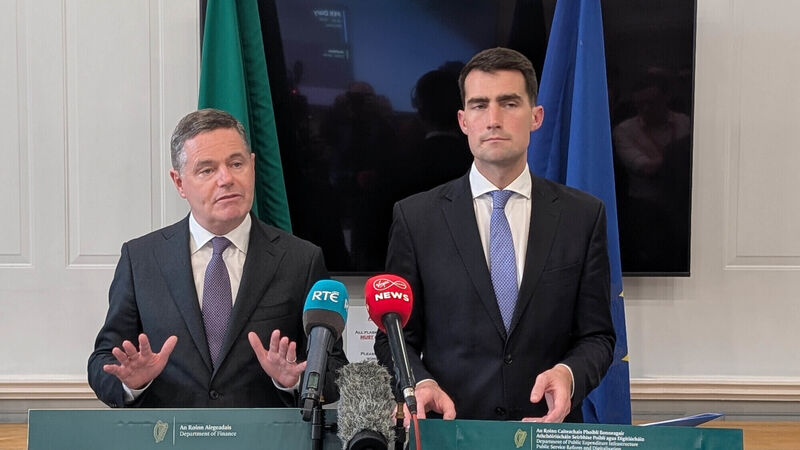Budget 2026 live updates: Funding for new gardaí, teachers and SNAs announced

Finance minister Paschal Donohoe and public expenditure minister Jack Chambers.
A total of €3.8 billion has been committed to the Department of Children, Disability and Equality for disability services. This will fund 250 new residential care placements next year, the funding of 6,500 private assessments for families on disability waiting lists, and more than 150,000 hours of home support and personal assistance.
Mr Chambers added that a dedicated unit has been established in the Department to lead a full review of Ireland's disability service model.
The income disregard for the carer’s allowance will increase to €1,000 for a single person and €2,000 for a couple, the domiciliary care allowance will also go up €20 to €380 per month and there will be an increase in the child support payment by €8 for children under 12, and €16 for children over 12.
Government funding for early years will rise by €125m to €1.5 billion next year, increasing the number of children benefitting from the National Childcare Scheme by around 35,000.
The government will also fund extensions of community centres and schools to create around 2,300 extra childcare places, and an Access and Inclusion Model to help children with a disability to access education will be funded, while €1.3 billion is being provided to Tusla.
The total capital allocation for the Department of Education will be €1.6bn. There will be an additional 1,717 SNAs in 2026 and 1,042 teaching posts, as well as funding for DEIS Plus and a new DEIS Plan.
Capacitation rates paid to all schools will also increase by €50 for primary and special schools and €20 for post-primary schools.
The Department of Further and Higher Education, Research, Innovation and Science will receive funding of almost €5 billion in 2026.
This will go towards increased apprenticeships, and 1,110 new places in key health and social care professions.
There is a loud response from the opposition when a permanent €500 reduction in university fees is announced – a €1,000 temporary reduction has been in place the last three years, with opposition parties saying that the €500 reduction is more like a €500 increase.
This capital allocation will also go towards two new veterinary medicine colleges to almost double the number of veterinary graduates, and the progression of centres of excellence for retrofit skills.
€6.17 billion will be allocated to the Department of Justice, Home Affairs and Migration, to be used for the recruitment of up to 1,000 trainee gardaí in 2026, an additional 200 civilian staff, further intakes into the Garda Reserve and €19 million to increase the budget for Garda overtime.
A further €39 million will go to the Irish Prisons Service, €11 million to the Courts Service, €6.7 million to the Irish Probation Service, €11.5 million for Domestic and Gender Based Violence initiatives, €7.3 million to Youth Justice interventions.
Funding for the Department of Defence will increase by 11% to €1.49 billion next year, leading to an increase of 400 defence force members and the creation of 50 new civilian posts.
€1.3 billion will be allocated to the Department of Foreign Affairs and Trade, including a €30m increase in development aid.
Another €1.3 billion will go to the Department of Enterprise, Tourism and Employment, going towards Enterprise Ireland, the IDA and Local Enterprise Development Offices.
The Department of Culture, Communications and Sport will receive €1.5 billion, including €3m in funding for the establishment of League of Ireland academies and €1.6m towards intercounty Gaelic games.
€84.9m has been announced for major arts and culture projects including the Crawford Art Gallery in Cork, while the minister committed that a successor to the pilot basic income for the arts scheme will be delivered in 2026.
€433m will support the completion of the National Broadband Plan, with €5m in additional funding provided to support the Post Office Network and €357m provided for broadcasting.
Resources to the Shared Island initiative will double by a further €1 billion out to 2035, under Budget 2026.
Mr Chambers commended his budget to the house, and it’s straight into feedback from the opposition, with Sinn Féin’s Pearse Doherty saying the budget does “nothing” for ordinary working people.
Mr Chambers, minister for public expenditure, said he is allocating €116.8 billion in 2026, an €8.1 billion increase on this year's allocation.
He outlined some more headline figures: €1 billion in a contingency reserve, €2 billion for social protection, €1.5 billion for health and €1.2 billion for public service pay agreement adjustments.
This will support an increase of 12,500 public sector staff including over 3,370 in the health sector, 2,600 in the education sector, and up to 1,000 in An Garda Síochána, he said.
Budget 2026 will allocate €11.3 billion in funding to the Department of Housing, Local Government and Heritage which will go towards the delivery of new build social homes, social support programmes, starter homes programme, urban regeneration development, a new housing activation infrastructure fund, retrofitting social homes and adapting homes for older people and people with disabilities.
A total of €12.2 billion in capital funding will expand water and wastewater services, with €1.4 billion to Uisce Éireann, €3.5 billion to ESB and Eirgrid, and €1.1 billion to the department of climate, energy and the environment.
The weekly fuel allowance rate will go up by €5, and eligibility for the allowance will be extended to all households in receipt of the working family payment.
The working family payment itself has seen income thresholds increase by €60 a week, and the back to school clothing and footwear payment will be widened to include two and three year olds.
The Christmas double social welfare payment will be provided again this year.
A total of €4.7 billion will be allocated to the Department of Transport, with €940m going towards funding and subsidising existing public transport services.
Next year's funding will also go towards the continued rollout of Bus Connects and the first phase of a commuter rail programme to expand capacity in the Cork area, while road projects including the M28 Cork to Ringaskiddy road were mentioned, and there will also be a number of major greenway and active travel projects funded and developed in 2026.
A record level of total funding of €27.4 billion will be allocated to the Department of Health, going towards an increase in acute hospital capacity of at least 220 beds and the expansion of diagnostic services.
At least 280 community beds, investment in the community nursing units refurbishment programme, and reductions in community waiting lists will also be prioritized with this funding, as well as an additional 1.7 million Home Support Hours, 500 more nursing home places, increased staffing and expansion of mental health services, increased access to CAMHS and improved community and primary care services.
The minister for finance has announced an increase to carbon tax - a tax of €71 per tonne of CO2 emitted will be applied to auto fuels, effective from tomorrow.
Excise duty on a pack of cigarettes will increase by 50 cent, with a pro rata increase on other tobacco products.
Mr Donohoe also announced €200 million of additional external funding for Home Building Finance Ireland, which provides finance to homebuilders across the country.
The €5,000 VRT relief for electronic vehicles will be increased by a further year to the end of 2026, and a new vehicle category for zero emission cars will be created.
Mr Donohoe commended his budget to the house. Jack Chambers begins his speech at ten to two, saying: “We must take every opportunity to strengthen the foundations of our economy.
“Ireland stands at a crossroad,” with decisions made now to determine the future of the country, he said, adding that their decisions are grounded in the best interest of the nation.
Their aim is to ensure the most vulnerable in Irish society are protected while striving to make the country more competitive, protect jobs and create new ones, as well as focus on building homes, he said.
Mr Donohoe noted “we are exposed to external economic downturns,” in Ireland, stating the importance in investing in Irish businesses.
The minimum wage is to increase by 65c to €14.15 as of January 1 2026. The USC 2% rate band rises to €28,700 to ensure full time workers on minimum wage will remain outside top rate of USC and giving modest benefit to workers whose income is above that amount.
The Government “will stand by” commitments to make changes to income tax over the next years of his term, but none will come in today’s budget.
The VAT rate on food and catering businesses and hairdressing services will be reduced from 13.5% to 9%. This will come into effect in July next year, and will cost €681m per full year, but lead to additional jobs in these industries, he said.
The rate of the Research and Development Tax Credit will be increased from 30% to 35%, while incentives have also been announced for film and game industries through tax relief and tax credits, respectively.
The bank levy is being extended for one further year, with a target yield of €200million.
Housing is the first item on the agenda - Finance minister Paschal Donohoe tells the Dáil that the Government is committed €5bn in capital investment for housing delivery in 2026.
The government will be reducing vat rate as applied to the sale of completed apartments to 9% from 13.5% for completed apartments, to deliver more and higher density apartments.
There will also be a corporation tax deduction on the construction of apartment developments, and rental profits from homes that fall within the cost rental scheme are to be exempted from corporate tax.
To tackle dereliction, a new derelict property tax will be introduced. It will be implemented and collected by revenue, to replace the derelict site levy, currently charged at a rate of 7% of site market value. The new tax will not be at a lower rate than this, Mr Donohoe said.
The involvement of revenue in derelict site levy collection has been called for by opposition TDs and representative groups for many years, due to a very low rate of payment of the levies, which were formerly charged and collected by local authorities.
The Residential Development Stamp Duty refund scheme will be extended to the end of 2030 and the income tax deduction for small landlords who retrofit their properties will be extended for three years.
The rent tax credit will also be extended by a further three years to the end of 2028, while the mortgage interest tax relief will be extended for a further two years.
The Dáil chamber is full for the delivery of this year’s budget.
Finance minister Paschal Donohoe speaks first, and will deliver a speech of around 45 minutes, which you can watch live on the Oireachtas website. Public expenditure minister Jack Chambers will give a statement after this.
Mr Donohoe promises that the budget will “invest in our future while securing the jobs, prosperity and stability of today”, adding that it will “tackle the serious challenge of meeting our housing needs… while preparing for tomorrow.” He reflected on progress made in the county in areas including employment but stated that there are challenges including around housing and cost of living.
“Uncertainty is the defining feature of the world this year”, he said, mentioning the tariffs imposed by the Trump administration this year, which he called “regrettable”. While praising the EU US agreement, he said that tariffs will have an impact in the years to come, and that this year’s budget has been created with this in mind.
The budget will protect jobs, with the expectation of adding 63,500 jobs this year, as well as growth in real wages, he said, adding they were “acutely aware that prices remain high”, saying that the budget will address this through targeted supports for those most in need.
Overall, the budget will be €9.4billion euro, he said.
The Government will outline its annual Budget shortly, amid scrutiny of its tax and expenditure priorities.
It has set parameters for a planned package of €9.4 billion in Budget 2026, including €7.9 billion in additional public spending and €1.5 billion envelope for tax measures.
The Central Bank, Irish Fiscal Advisory Council (IFAC) and Economic and Social Research Institute (ESRI) have raised concerns about the risk of the planned Budget package overheating the economy.
Finance minister Paschal Donohoe and public expenditure minister Jack Chambers will attempt to allay those fears as they reveal the Budgetary measures in the Dáil from 1pm.
Certain features of the Budget have already been well trailed, with Mr Donohoe outlining that there will be no changes to personal taxes, adding that indexation would have taken up the majority of overall the tax package.
It is expected, however, that the Government will move to cut Vat for food-led hospitality from 13.5% to 9%, after a long-running campaign for a sector which has sought to highlight a rising cost of business.
Businesses say the proposal, which will exclude accommodation and is expected to kick in in July rather than January, is necessary to protect jobs.
The Government is also expected to announce a Vat cut for new-build apartments in an effort to drive delivery of housing.
Elsewhere on housing, ministers have highlighted the importance of the renters’ tax credit, which would be due to expire if not extended on Tuesday.
However, in the first Budget since the election returned Fianna Fáil and Fine Gael to Government, coalition figures have warned that there will be no repeat of a bumper cost-of-living package containing other “one-off” universal measures such as energy credits.
The Government has instead said its approach will focus on more targeted and permanent measures.
Students will be looking to see if there is any permanent cut to student fees, although any reduction below €1,000 may be seen as a year-on-year increase after a temporary cut of that amount expires.
Another closely watched measure is the extent of an increase to core social protection rates, with a Christmas bonus also regularly featuring in recent budgets.
Amid regular budget staples like a duty increase for cigarettes, moves to make a trialled scheme of basic income for artists more permanent could also feature.
At the conclusion of the ministers’ speeches, opposition parties – who have set out their own alternative Budgets in the preceding week – will have the opportunity to respond and critique the coalition’s plan for the year ahead.










 App?
App?


